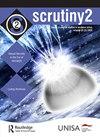错位:约翰·卡尼《只有真相》中的记忆动力与自由困惑
IF 0.1
0 LITERATURE
Scrutiny2-Issues in English Studies in Southern Africa
Pub Date : 2018-01-02
DOI:10.1080/18125441.2018.1483417
引用次数: 3
摘要
摘要:本文对南非真相与和解委员会(TRC)成立后赋予记忆与和解的意义提出质疑。本文通过对约翰·卡尼(John Kani)的戏剧《唯有真相》(Nothing but the Truth, 2002年出版)中的主观性的分析来讨论这些意义。这出戏是为数不多的戏剧项目之一,它大胆地解决了空间和时间上的(混乱)位置和断裂、记忆和和解等弹性概念。扎克斯·姆达断言“过去将永远是一个强大的存在在现在”(Nothing but the Truth)。约翰尼斯堡:威特沃特斯兰德大学出版社,2002年,第3页),结论是卡尼的戏剧错综复杂地揭示了自由的困惑。自由不再被视为一种整体的体验:它既是个人的,也是社会政治的;它既是烦恼的,也是理所当然的。后种族隔离时代的经历传达的不仅仅是自由的梦想。Arjun Appadurai的“白话文全球化”概念是本文的框架。本文章由计算机程序翻译,如有差异,请以英文原文为准。
Dislocations: The Dynamics of Memory and Perplexities of Freedom in John Kani’s Nothing but the Truth
ABSTRACT This article questions the meanings ascribed to memory and reconciliation after the Truth and Reconciliation Commission (TRC) in South Africa. It discusses these meanings through an analysis of the subjectivities projected in John Kani's play Nothing but the Truth (published in 2002). This play is one of the few theatrical projects that boldly address the elastic concepts of (dis)locations and disjunctures, memory, and reconciliation both spatially and temporally. Zakes Mda asserts that “the past will always be a powerful presence in the present” (Nothing but the Truth. Johannesburg: University of Witwatersrand Press, 2002, 3) and concludes that Kani's play intricately unpacks the perplexities of freedom. Freedom ceases to be perceived as a monolithic experience: it is as personal as it is socio-political and as vexed as it is taken for granted. Post-apartheid experiences convey a lot more than dreams of freedom. Arjun Appadurai's concept of “vernacular globalization” is used to frame this article.
求助全文
通过发布文献求助,成功后即可免费获取论文全文。
去求助
来源期刊
CiteScore
0.50
自引率
0.00%
发文量
10
期刊介绍:
scrutiny2 is a double blind peer-reviewed journal that publishes original manuscripts on theoretical and practical concerns in English literary studies in southern Africa, particularly tertiary education. Uniquely southern African approaches to southern African concerns are sought, although manuscripts of a more general nature will be considered. The journal is aimed at an audience of specialists in English literary studies. While the dominant form of manuscripts published will be the scholarly article, the journal will also publish poetry, as well as other forms of writing such as the essay, review essay, conference report and polemical position piece. This journal is accredited with the South African Department of Higher Education and Training.

 求助内容:
求助内容: 应助结果提醒方式:
应助结果提醒方式:


